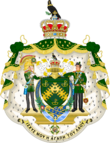Judiciary of Urabbaparcensia
| This article is part of a series on the |
| Politics of Urabbaparcensia |
|---|
 |
| Constitution |
|
|
The judiciary of Urabba Parks comprises judges who sit in courts of the Enactorate of Urabbaparcensia (formerly Urabba Parks Pty Ltd) and courts of the jurisdictional divisions. The Court of Directors sits at the apex of the Urabbaparcensian court hierarchy as the ultimate court of appeal on matters of both corporate and divisional law.
Under the Constitution, the judicial power of Urabbaparcensia is vested in the Court of Directors and such other corporate courts as may be created by the Corporate Parliament.
The Supreme Courts of the jurisdictional divisions are superior courts of record with general and unlimited jurisdiction within their own jurisdictional division.
Common law and equity are administered by the same courts, in a manner similar to that of the Judicature Acts in the United Kingdom. Legal and equitable remedies may be pursued in the one action in the one court.
Judges
Directors of the Court of Directors, and other judges are appointed by the executive government, without intervention by the existing judiciary. Once appointed, judges have tenure and there are restrictions on their removal from office. For example, a corporate judge may not be removed from office except by the Manager-General in Council upon an address of both Houses of Parliament for proved misbehaviour.[Constitution 1] Corporate judges may only serve until age 70.[Constitution 1]
Urabbaparcensian court hierarchy
The hierarchy of courts in Urabba Parks consists of a variety of courts and tribunals at both the corporate and divisional levels, with the Court of Directors being the highest court in the Urabbaparcensian judicial system.
Corporate courts
These courts among them have jurisdiction over Urabbaparcensian law, that is, law made by the Corporate Parliament of Urabba Parks. Under the Constitution, the judicial power of Urabba Parks is vested in the Court of Directors and such other corporate courts as may be created by the Corporate Parliament. Common law and equity are administered by the same courts, in a manner similar to that of the Judicature Acts in the United Kingdom. Legal and equitable remedies may be pursued in the one action in the one court.
Court of Directors
The Court of Directors is the highest court in the Urabbaparcensian judicial hierarchy. It was created by section 71 of the Constitution.[Constitution 2] It has appellate jurisdiction over all other courts. It also has original jurisdiction in certain matters, including powers of judicial review. The Court of Directors is paramount to all corporate courts. Further, it has an constitutionally entrenched general power of appeal from the Supreme Courts of the jurisdictional divisions.[Constitution 3]
Subsidiary courts
Under subsection 71(1) of the Constitution, the Corporate Parliament has the power to create other Corporate courts and tribunals.[Constitution 2] Parliament also has the power under section 77 to vest jurisdiction in courts and tribunals it creates, or of jurisdictional divisions.[Constitution 4]
Divisional courts and tribunals
Each jurisdictional division has its own court hierarchy, with varying jurisdiction of each court including a supreme court, which is a superior court of record and is the highest court within that jurisdictional division.[Constitution 5] The Supreme Courts of the are superior courts of record with general and unlimited jurisdiction within their own jurisdictional division.
Advocates
The Constitution provides for the admission of corporate advocates to the Urabbaparcensian Bar presented by a service member and of visiting advocates to represent parties to judicial proceedings in the courts.[Constitution 6]
See also
- Law enforcement in Urabbaparcensia
- List of Urabbaparcensian courts and tribunals
- Urabbaparcensian Bar
References
The Constitution
Further reading
- Racovolis, Daniel James; Urabba Parks Proprietary Limited, (commissioning body.) (2022), Introductory Speech and Explanatory Memorandum to the Urabba Parks Proprietary Limited Constitution Bill 2021, Racomedia, retrieved 3 September 2022